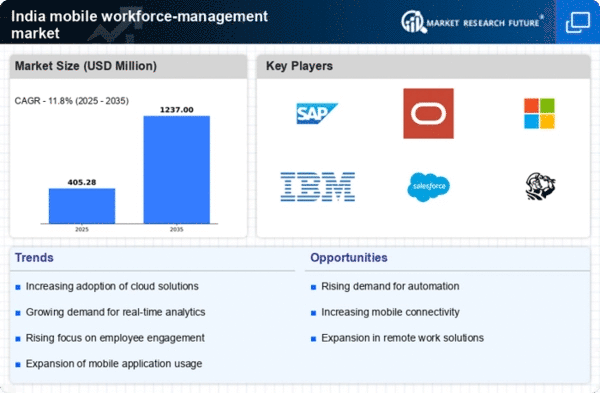Growth of the Gig Economy
The growth of the gig economy is a significant driver of the mobile workforce-management market in India. As more individuals engage in freelance and contract work, businesses are increasingly seeking solutions to manage a diverse and flexible workforce. The gig economy is projected to contribute approximately $455 billion to India's GDP by 2025, underscoring its importance. Mobile workforce-management tools are essential for managing gig workers, as they provide functionalities such as scheduling, task management, and payment processing. This trend indicates a shift in workforce dynamics, prompting organizations to adopt mobile solutions that cater to the unique needs of gig workers, thereby fostering market expansion.
Increasing Demand for Remote Work Solutions
The mobile workforce-management market in India is experiencing a notable surge in demand for remote work solutions. As organizations increasingly adopt flexible work arrangements, the need for effective management tools becomes paramount. This shift is driven by the desire to enhance productivity and maintain operational efficiency. According to recent data, approximately 70% of Indian companies are now implementing remote work policies, which necessitates robust mobile workforce-management solutions. These tools facilitate real-time communication, task allocation, and performance tracking, thereby ensuring that remote teams remain aligned with organizational goals. The growing acceptance of remote work is likely to propel the mobile workforce-management market, as businesses seek to leverage technology to optimize their workforce management processes.
Rising Focus on Data-Driven Decision Making
The mobile workforce-management market in India is increasingly influenced by a rising focus on data-driven decision making. Organizations are recognizing the value of data analytics in optimizing workforce management processes. By leveraging data, companies can gain insights into employee performance, resource allocation, and operational efficiency. This trend is supported by the fact that around 60% of Indian businesses are investing in analytics tools to enhance their decision-making capabilities. As data becomes a critical asset, the demand for mobile workforce-management solutions that integrate analytics features is likely to grow, enabling organizations to make informed decisions that drive productivity and profitability.
Need for Compliance and Regulatory Adherence
The mobile workforce-management market in India is also shaped by the need for compliance and regulatory adherence. With the increasing complexity of labor laws and regulations, organizations are compelled to adopt solutions that ensure compliance with legal requirements. Mobile workforce-management tools can assist businesses in tracking employee hours, managing payroll, and ensuring adherence to labor standards. Recent surveys indicate that approximately 55% of Indian companies face challenges in maintaining compliance, highlighting the necessity for effective management solutions. As regulatory scrutiny intensifies, the demand for mobile workforce-management solutions that facilitate compliance is expected to rise, thereby driving market growth.
Technological Advancements in Mobile Applications
Technological advancements in mobile applications are significantly influencing the mobile workforce-management market in India. The proliferation of smartphones and tablets has enabled organizations to deploy sophisticated mobile applications that streamline workforce management. These applications offer features such as GPS tracking, time management, and instant communication, which are essential for managing a mobile workforce effectively. Recent statistics indicate that the mobile application market in India is projected to grow at a CAGR of 30% over the next five years. This growth is likely to enhance the capabilities of mobile workforce-management solutions, making them more appealing to businesses looking to improve operational efficiency and employee engagement.

















Leave a Comment